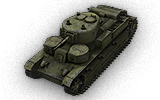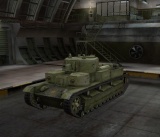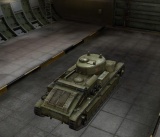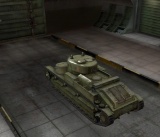T-28
| Revision as of 18:57, 6 May 2012 | Revision as of 14:21, 8 May 2012 0.7.3 | |||
| Line 3: | Line 3: | |||
| {{panel title|icon=[[image:USSR-T-28.png|link=|left]]|rMargin=248px|content= | {{panel title|icon=[[image:USSR-T-28.png|link=|left]]|rMargin=248px|content= | |||
| The '''T-28''' is a [[USSR|Soviet]] tier 4 [[Medium Tanks|medium tank]]. This tank is best described as an "odd" tank. It is one of the largest tanks in the early tiers, making it a proverbial barn door for incoming fire; a fact not helped by its rather poor armor. Having said this, it is surprisingly fast and maneuverable. Although its initial guns are weak, it can eventually equip some extremely-effective armament, including the brutal 85 mm F-30; giving it the punch of a tank twice its tier. The 57mm guns are also very accurate, have a fast firing rate and are probably preferred over the slightly higher-damage dealing 76mm guns. These contradictions lead to the T-28 using some rather odd tactics; it can't slug it out with the heavies and its size means speed and stealth aren't much help either. Caution is the best policy with the T-28. Let your team mates push forward and find the enemy, then use your speed and acceleration to get to the place you're most needed and use your excellent firepower to help tip the balance. A T-28 can also be quite an effective scout due to its speed. | The '''T-28''' is a [[USSR|Soviet]] tier 4 [[Medium Tanks|medium tank]]. This tank is best described as an "odd" tank. It is one of the largest tanks in the early tiers, making it a proverbial barn door for incoming fire; a fact not helped by its rather poor armor. Having said this, it is surprisingly fast and maneuverable. Although its initial guns are weak, it can eventually equip some extremely-effective armament, including the brutal 85 mm F-30; giving it the punch of a tank twice its tier. The 57mm guns are also very accurate, have a fast firing rate and are probably preferred over the slightly higher-damage dealing 76mm guns. These contradictions lead to the T-28 using some rather odd tactics; it can't slug it out with the heavies and its size means speed and stealth aren't much help either. Caution is the best policy with the T-28. Let your team mates push forward and find the enemy, then use your speed and acceleration to get to the place you're most needed and use your excellent firepower to help tip the balance. A T-28 can also be quite an effective scout due to its speed. | |||
| ? | :The T-28 leads to the [[KV]]. | + | :The T-28 leads to the [[KV-1]]. | |
| }}{{:{{PAGENAME}}/Modules}}{{:{{PAGENAME}}/Equipment}}{{:{{PAGENAME}}/Consumables}} | }}{{:{{PAGENAME}}/Modules}}{{:{{PAGENAME}}/Equipment}}{{:{{PAGENAME}}/Consumables}} | |||
| {{Panel content | {{Panel content | |||
Revision as of 14:21, 8 May 2012

The T-28 is a Soviet tier 4 medium tank. This tank is best described as an "odd" tank. It is one of the largest tanks in the early tiers, making it a proverbial barn door for incoming fire; a fact not helped by its rather poor armor. Having said this, it is surprisingly fast and maneuverable. Although its initial guns are weak, it can eventually equip some extremely-effective armament, including the brutal 85 mm F-30; giving it the punch of a tank twice its tier. The 57mm guns are also very accurate, have a fast firing rate and are probably preferred over the slightly higher-damage dealing 76mm guns. These contradictions lead to the T-28 using some rather odd tactics; it can't slug it out with the heavies and its size means speed and stealth aren't much help either. Caution is the best policy with the T-28. Let your team mates push forward and find the enemy, then use your speed and acceleration to get to the place you're most needed and use your excellent firepower to help tip the balance. A T-28 can also be quite an effective scout due to its speed.
- The T-28 leads to the KV-1.
R06 T-28/ModulesR06 T-28/EquipmentR06 T-28/Consumables
Pros and Cons
Pros:
- Above average hit points
- Above average engine power
- Above average damage and penetration
- Above average accuracy, turret traverse speed, and elevation arc
- Above average view range
Cons:
- Below average top speed and traverse speed
- Below average hull and turret armour
- Below average rate of fire
- Below average aim time
- Below average ammo capacity
- Below average signal range
Combat Effectiveness
Early Research
Suggested Equipment
Historical Info
The type didn't have that much success in combat, but it played an important role as a development project for the Soviet designers. A series of new ideas and solutions were tried out on the T-28 and were later incorporated in future models.
Design History
The T-28 was in many ways similar to the British Vickers A1E1 Independent tank. This tank greatly influenced tank design in the period between the wars, although only one prototype was manufactured in 1926. The Kirov Factory in Leningrad began manufacturing a tank, which was based on the British Independent in 1932. The T-28 tank was officially approved on August 11, 1933. The T-28 had one large turret with a 76.2mm gun and two smaller turrets with 7.62mm machine guns. A total of 503 T-28 tanks were manufactured over a period of 8 years from 1933 to 1941.
Combat History
The T-28 was deployed during the Invasion of Poland and the Winter War against Finland. During the initial stages of the Winter War, the tank was used in direct fire missions against Finnish pillboxes. In the course of these operations, it was found that the armour was inadequate and programs were initiated to upgrade it. Frontal plates were upgraded from 50 mm to 80 mm and side and rear plates to 40 mm thickness. With this up-armoured version the Red Army broke through the main Finnish defensive fortification, the Mannerheim Line. According to Russian historian M. Kolomietz's book "T-28. Three-headed Stalin's Monster", over 200 T-28s were knocked out during the Winter War, but only 20 of them were in irrecoverable losses (including 2 captured by the Finnish Army). Due to proximity of the Kirov Plant, all other knocked-out tanks were repaired, some of them over five times.
The Finns knew the T-28 as the Postivaunu ("mail wagon" or stagecoach), a name which alluded to Finnish troops' discovery of Red Army field mail sacks inside the first destroyed T-28. Another explanation is that the high profile of the tank resembled the old west stagecoaches of the United States. Finns captured two T-28s during the Winter War and five in Continuation War, for a total of 7 vehicles.
The Soviets had 411 T-28 tanks when the Germans invaded the Soviet Union in June 1941. Most T-28s were lost during the first two months of the invasion, many of them abandoned after mechanical breakdown. Some T-28s took part in the 1941 winter defence of Leningrad and Moscow, but after late 1941, they were rare in Red Army service; a few were operated by enemy forces.
Today three T-28s remain, two in Finland and one in Moscow. One restored T-28 is on display in Finnish field camouflage in the Parola Tank Museum, Finland.
| Light Tanks | MS-1 • BT-2 • Tetrarch • T-26 • T-60 • BT-7 • BT-SV • LTP • M3 Light • T-127 • T-46 • T-70 • A-20 • T-50 • T-80 • Valentine II • T-50-2 • MT-25 |
| Medium Tanks | A-32 • T-28 • Matilda IV • T-34 • T-34-85 • A-43 • KV-13 • T-43 • A-44 • T-44 • Object 416 • T-54 • Object 430 II • Object 283 • T-62A • Object 140 • Object 430 |
| Heavy Tanks | Churchill III • KV • KV-1 • KV-220 • KV-220 Beta-Test • KV-1S • KV-2 • T-150 • IS • KV-3 • IS-3 • IS-6 • KV-4 • KV-5 • IS-8 • ST-I • IS-4 • IS-7 |
| Tank Destroyers | AT-1 • SU-76 • SU-85B • SU-85 • SU-85I • SU-100 • SU-100Y • SU-100M1 • SU-122-44 • SU-152 • ISU-152 • SU-101 • Object 704 • SU-122-54 • Object 263 • Object 268 |
| Self-Propelled Guns | SU-18 • SU-26 • SU-5 • SU-122A • SU-8 • S-51 • SU-14-1 • SU-14-2 • 212A • Object 261
|


